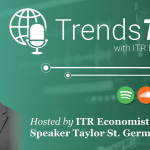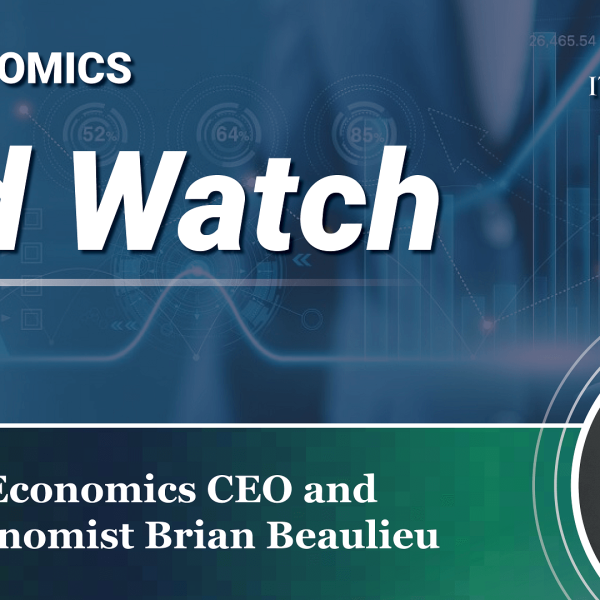- Mon - Fri: 8:30 - 5:00
- +1-603-796-2500
- ITR@itreconomics.com
with Brian Beaulieu
WEEKLY FED WATCH
Tune in to a new episode of Fed Watch with ITR Economics CEO Brian Beaulieu as he discusses the many takeaways from Federal Reserve Board Governor Christopher J. Waller’s speech at the New York Economics Club.
Key Episode Takeaways
- 0:18 – Recapping Governor Waller’s speech at the New York Economics Club
- 1:12 – The manufacturing sector is cooling off
- 1:44 – The Fed is in no hurry to lower interest rates
- 2:02 – Data points we are looking at in regard to the economy and inflation
- 5:16 – We continue to think the Fed will lower interest rates in the second half of the year
- 5:50 – Summary and conclusion
The below transcript is a literal translation of the podcast audio that has been machine generated by Rev.
Welcome to this edition of Fed Watch. I’m Brian Beaulieu and today is March 29, 2024.
Earlier this week a Fed governor, Governor Walker gave a speech at the New York Economics Club and it was interesting. As Fed speeches go, he called inflation still hot, more on that in a moment, and the employment situation becoming more balanced. In fact, there was an interesting notice out of the Philly Federal Reserve that they may be downward revising some of the employment data, at least for that state. It wasn’t terribly clear, more on that, but at least they see that it is moderating. The Atlanta Fed, he reported out, with their early outlook for GDP expects the first quarter to come in at 2.1%, a considerable cooling from the fourth quarter number, which was very strong. And that’s consistent with what we are seeing and what we are forecasting. So all of that makes sense from our perspective.
He acknowledged that the manufacturing sector is cooling off, new orders are down a bit. He specifically referenced the ISM’s Purchasing Managers Index. New orders are down in that index. Inventories are not right. The only thing that’s looking good is deliveries are improving because supply chain issues are going away and the order board isn’t lighting up like it once was.
So I think they’re going to see that… I’m sorry. Governor Walker was also saying that they’re in no hurry to lower interest rates. He said there’s still time we’re in no rush. They want to see the economy cool down some more and I think they’re going to get their wish and they want to see inflation continue to be tamed rather than calling it hot. And I think they’re going to get their wish there with some of the data that we’re looking at.
And those data points are, one, world industrial production, early data for 2024, it’s just January data. The rate of growth for the world in IP slowed down to 1.2%, sorry. And what’s even more worrisome is that from December to January it fell like half a percentage point and that’s significantly worse than anything that could be considered normal. So the whole world seemed to lurch into a slowdown mode early in this first quarter. We’re also seeing where the Personal Consumption Index, [inaudible 00:02:45] acronym PCE, price index, which is what the Fed watches excluding food and energy, also saw a slowdown in the rate of inflation. Most people had been expecting that it would accelerate like we saw in the CPI, but this rate measurement that the Fed prefers showed 2.8% rate of inflation, that’s down from 2.9% year-over-year inflation reported in the prior month. So this data through February is giving some cooling indications in the rate of inflation. In fact, that’s the lowest core inflation reading we’ve gotten since March 2021. So it was a noteworthy number, should give the Fed a little bit more breathing room about interest rates.
We’re also seeing, and this is data that came out today, disposable personal income shows some weakness. Real personal income, excluding government transfer payments, real simply means adjusted for inflation, has really cooled off in its rate of rise. It was up 2.4% year over year. But the 112 clearly is in phase C. So we’re seeing that rising trend in real income slowing down that’s going to have a detrimental impact on retail sales’ rate of growth as we look a little bit down the road here in ’24.
The disposable personal income data for the month was not particularly good, it was up 1.7% from one year ago, and that includes all the government largesse and everything. That’s not a strong way to growth at all. Savings rate is down. Real dollar savings are down 19.5% from one year ago. So people, their income stream is lightening up in terms of the rate of rise, they’ve dipped into their savings in the first quarter of 2024, at least through February. The phase D and the dollar savings is very noteworthy. All of that, you add it up and it means we’re going to see a more and more sluggish economy going through 2024.
At ITR we continue to think it is just going to be sluggish. The professional services side of the economy, the GDP services will slow and we are going to see that mild downturn in manufacturing, it’s already there. And the leading indicators say it’s going to continue to be there.
All of which leads us to what you tuned in for. The Federal Reserve, we continue to think will lower interest rates in the second half of the year. I had originally thought it was going to be May back when we started doing these recordings, but then the Fed got some of that relatively strong data and they seem to have pulled back from that. The futures market says high probability that something happens in the third quarter, either June or July. They don’t meet in August, the Fed doesn’t meet in August. So June or July, high probability that we’ll get a 25 BPS decline and then two more after that is what the futures market is saying.
We’re going to get that movement in long-term interest rates also. So toward the end of ’24, early ’25, when these interest rates have come down, the economy’s about to turn back up and re-accelerate, it’ll be a great time to make you move if you want to leverage the rest of this decade. That part of the story remains right on track.
Thanks for listening to this edition of Fed Watch. I’ll see you next week.


